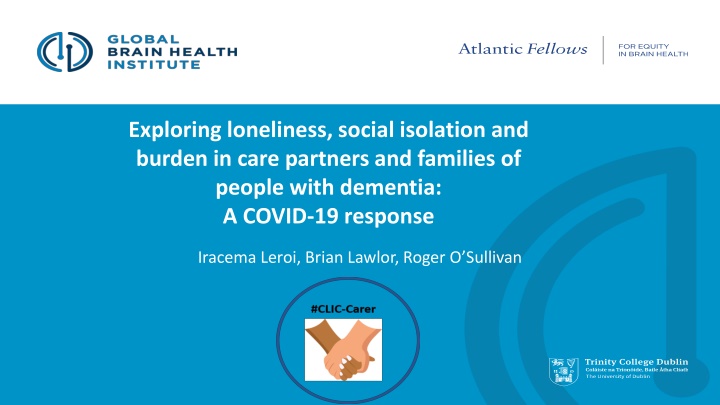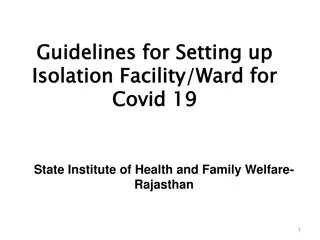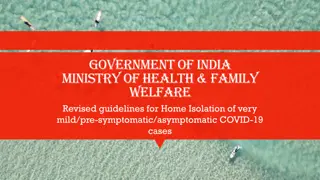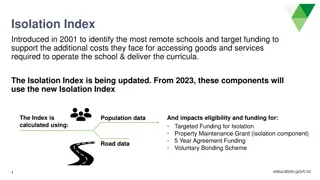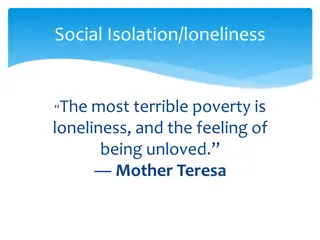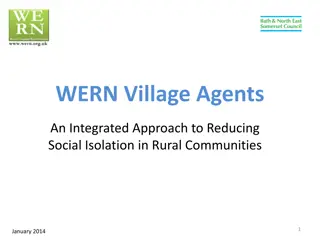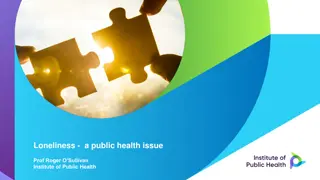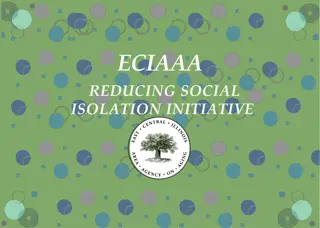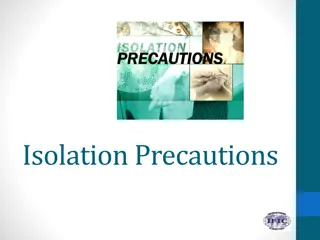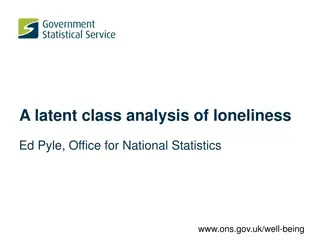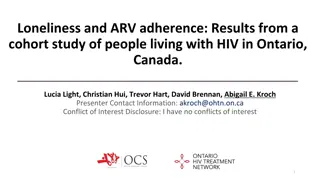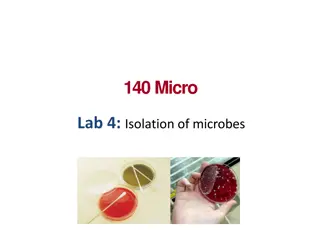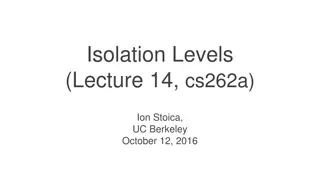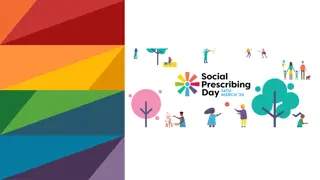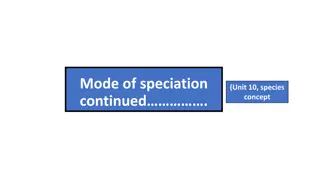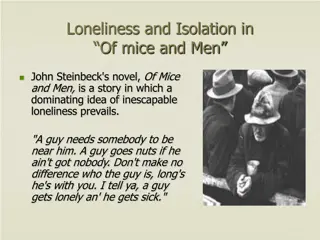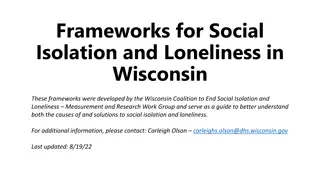Loneliness, Social Isolation, and Burden in Care Partners and Families of People with Dementia
This study delves into the impact of COVID-19 on care partners and families of individuals with dementia, shedding light on the experiences of loneliness, social isolation, and caregiving burden. The researchers, Iracema Leroi, Brian Lawlor, and Roger O'Sullivan, discuss the challenges faced by these individuals and offer insights into how to address and support their needs during these unprecedented times.
Download Presentation

Please find below an Image/Link to download the presentation.
The content on the website is provided AS IS for your information and personal use only. It may not be sold, licensed, or shared on other websites without obtaining consent from the author.If you encounter any issues during the download, it is possible that the publisher has removed the file from their server.
You are allowed to download the files provided on this website for personal or commercial use, subject to the condition that they are used lawfully. All files are the property of their respective owners.
The content on the website is provided AS IS for your information and personal use only. It may not be sold, licensed, or shared on other websites without obtaining consent from the author.
E N D
Presentation Transcript
Exploring loneliness, social isolation and burden in care partners and families of people with dementia: A COVID-19 response Iracema Leroi, Brian Lawlor, Roger O Sullivan
Introduction to loneliness and caregiving in dementia Over 80% of people with dementia depend on a non-professional care partner or family member for support and care. Even before COVID-19, >90% of dementia care partners experienced significant burden and higher levels of loneliness and social isolation compared to non-carers. Loneliness and social isolation increase morbidity and mortality and undermine efforts to combat the virus as negative emotions lower immunity and obstruct positive health behaviours
Irish word for loneliness is uaigneaswhich literally means alienation and solitude This is also the word for grave
Thus, impacts of COVID-19 physical distancing/lockdown on the mental well- being and care burden are already manifesting as significant Many dementia care partner are older and have underlying conditions or disability 4
CLIC-DemCARE project Overall aim: To understand the impact of COVID-19 in care partners and families of people with dementia to drive policy, community and agency response. Goal 1: To explore care burden, loneliness and social isolation in NDD care partners and families of people with NDD living in COVID-19 restrictions. Hypothesis: Care partners with first-hand experience of COVID-19 bereavement will experience extreme loneliness. 5
Goal 2: To provide open access evidence on NDD care partners/families to policy makers, communities and care organizations to raise awareness, trigger support and inform policy and services. Hypothesis: Care partners will report high levels of practical and emotional need, with regional differences. 6
Goal 3: To link with an international survey of COVID-19 related loneliness/social isolation in a wider population to compare and understand the psychological impact of COVID-19. Hypothesis: Care partners will experience even greater levels of loneliness/isolation compared to other population groups, nationally and internationally. 7
Method: We will remotely survey (baseline; 3-months) a consecutive, convenience sample of non-professional NDD adult care partners and family participants (N=400+) in Europe, USA and Latin America. Our short, adapted survey (CLIC- DemCare Survey), will be aligned to a wider international comparator cohort (CLIC survey) led by the Institute of Public Health. 8
Inclusion criteria: To access the survey, all respondents will be asked to endorse the following criteria: non-professional primary care partner or family member of a person with NDD; 18 years or older; providing care (remotely or F2F), or in frequent contact (prior to COVID-19) 9
Care partner questions embedded in CLIC Are you a care partner for (i.e. caregiver ), or do you support, a person with a long-term health condition (including mental health) or disability? YES/NO ; If yes, please tick all that apply: Adult; Child (under 18 years) We will ask you more about your caring role at the end of this survey. At end of the survey: Since you stated you were a care partner of someone with a long-term condition in Question XXX, please answer the following short questions? What is your relationship to that person? Spouse/partner/Family member/Non-family member What type of long-term health condition or disability do they have? Physical condition (i.e. disability or long term illness)/Dementia /Mental health condition /Intellectual disability Other:______FREE TEXT Where do you provide care? In your own home In their home (i.e. you usually visit them to provide care) In a care facility (i.e. care home, residential care setting, group home , assisted living etc.) 10
Care partner questions embedded in CLIC Since COVID-19, in your role as a care partner, has your ability offer care changed or been interrupted? YES/NO If yes, how much: LIKERT 0 to 5 In what way? (please tick as many apply) Loss of visitation rights or access to a care facility Not being able to provide face-to-face care if they live in their own home Loss or reduction of outside support Loss or reduction of respite care such as day care facilities Needing to wear protective clothing Spending too much time together Being in a confined space together Lack of or reduction of information about the person you care for Not being able to be with the person your care for during illness or death Grieving alone or with limited support Lack of information about how to provide care Please describe how this has changed: OPEN TEXT BOX How burdened do you feel in your caring role? (Note to ROS: this is item 22 on the Zarit Burden Inventory and this corresponds with the other Zarit item) LIKERT 0 to 4 (**this is consistent with Zarit, which is not 0-5) Please describe how you feel about your caring role now? OPEN TEXT BOX 11
Languages and participating countries UK (England, Northern Ireland) USA* (Alzheimer Association) Canada Ireland Pakistan (Urdu version pending) Bangladesh (Bengali version released today) Spain Latin America (Chile, Peru, Mexico, Brazil) Romania France Egypt (and other Arabic countries) Ethiopia Finland 12
Responses until July 30, 2020 (closes Oct 2020) 11,876 7015 1149 761 454 168 111 15 452 428 384 276 190 82 46 18 37 16 14 11 10 11 5 2 1 0 0 1 3,344 1870 325 195 110 46 25 9 63 78 92 190 47 15 14 3 10 9 6 4 2 0 3 1 0 0 0 0 Overall USA Ireland UK NI England Wales Scotland Mexico Finland New Zealand France Canada Romania Egypt Chile Greece India Peru Belgium Pakistan Spain Netherlands Bangladesh Brazil Cyprus Jordan Ethiopia 13
